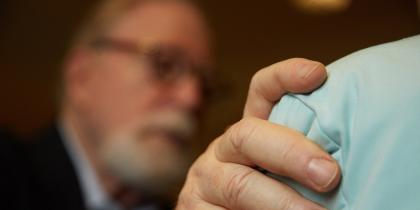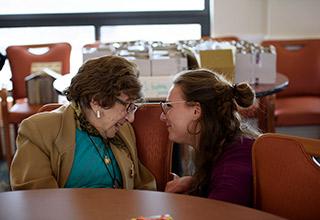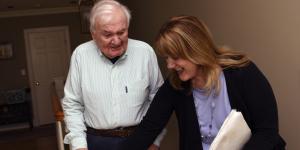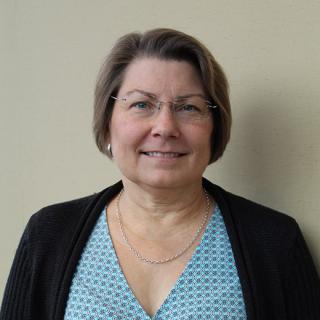Supporting Patients and Families at End of Life

Volunteers are very important to providing the best quality of life possible for our long-term chronic care hospital (LTCH) patients at Hebrew Rehabilitation Center (HRC). From being a friendly visitor, to a wheelchair transporter, to a bingo caller or “meal mate,” volunteers have endless opportunities to make a patient’s life brighter. But there is another significant role for volunteers, one that can offer immeasurable support and comfort to our patients and their families—that of an end-of-life volunteer.
End of life is a special and sacred time in the lives of our patients and their families. It can be a time of heartbreak and challenges, but also a time of reconnection, comfort and peace. Volunteers play a meaningful role in providing companionship and comfort to these patients and families. For example, they can provide support to a patient who is in the later stages of life by reading poetry or playing familiar music, or sit at a dying patient’s bedside so that they don't die alone.
I recently joined the HRC Volunteer Services team as a Volunteer Coordinator responsible for developing, coordinating, and managing the End-of-Life Volunteer Program. This program is being created in response to feedback from LTCH staff, who often visit these patients and provide companionship and support, but whose responsibilities prevent them from fulfilling every need identified. My role is to develop an effective program and train volunteers, arming them with the necessary tools and supports they will need to offer comfort and companionship to our patients facing end of life.
It takes a special person to serve as an end-of-life volunteer. I have spent the last 5 years of my career as a Volunteer Coordinator in hospice care, which relies heavily on volunteers as part of the hospice team, and I have come to recognize certain qualities that successful volunteers share. Many have a strong spiritual core, a desire to connect with others, and are deeply compassionate. Others have had meaningful experiences caring for loved ones or have been present at a loved one’s passing. Some feel “called” to do this very special work and speak about the deep fulfillment they experience as a result. One quality they all share is the ability to engage with a patient on the patient’s terms, without bringing a personal agenda to the relationship.
The work can be challenging—both patients and their families struggle with a range of emotions, from denial to sadness, and even anger. But for those volunteers who are drawn to it, the experience is also intensely rewarding. There is much to be gained by spending time with individuals at this unique point in their lives. Successful volunteers often bring a certain curiosity to their encounters—a willingness to share thoughts and memories, and a desire to walk alongside patients at this special time in their life. As a result volunteers learn and gain even more than they give. And, it’s safe to say they learn something about themselves and the reward that comes with making a difference in someone’s life.
I am reaching out to HRC employees, families, and the community to recruit volunteers for this program. Here’s what you need to know if you’re interested in volunteering as an end-of-life volunteer:
- Volunteer application and documentation for hospital compliance required
- Specialized training will be provided (approximately 15-20 hours)
- Volunteers will be assigned to visit a patient regularly, once a week or as requested
- Opportunities to shadow an experienced volunteer or the Volunteer Coordinator will be provided
- Ongoing support will be provided by the Volunteer Coordinator by phone and in person
- The Volunteer Coordinator will schedule monthly meetings of volunteers for group discussion, support and education
If you are interested in learning more about the end of life volunteer program, please contact Volunteer Coordinator Michelle Perry at michelleperry@hsl.harvard.edu.
Blog Topics
Learn More
Volunteer at HSL
From volunteering for our hospice program to participating in an intergenerational program, we offer many opportunities to make a difference in the lives of seniors.





